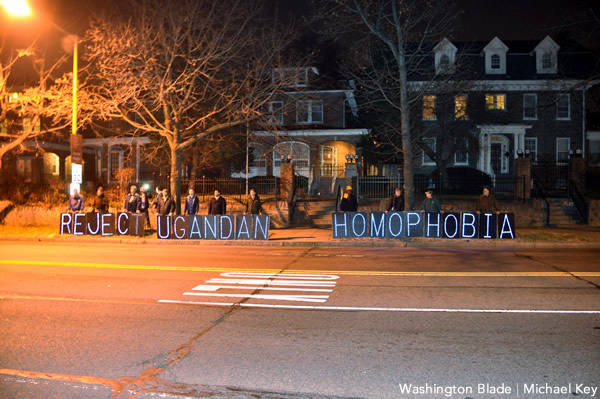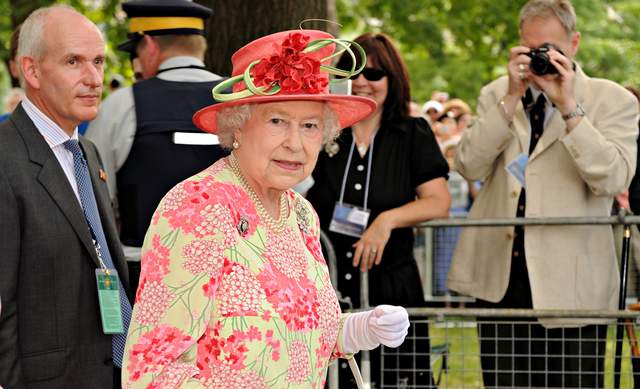Feature Image Photograph Copyright Philip Toscano, 2013, AP
Last Monday (March 11th) was Commonwealth Day! The Queen, as head of the Commonwealth, did some stuff to celebrate: most notably, she signed an equal rights charter, which is the first time in her 61-year reign that she’s publicly supported gay rights. Fantastic!
The Commonwealth Charter represents the first time that the 54 constituent nations of the Commonwealth have created a document detailing their core principles. It consists of 16 articles which the countries adopted in December, and among them is a pledge for equal rights. The charter states, “We are implacably opposed to all forms of discrimination, whether rooted in gender, race, colour, creed, political belief or other grounds.”
“Or other grounds.” As you may have noticed, there isn’t actually a direct reference to the LGBT community there, but according to The Daily Telegraph, “the words “other grounds” are said to refer to sexuality.” Ben Summerskill, the chief executive of gay rights charity Stonewall, said, “This is the first time that the Queen has publicly acknowledged the importance of the six per cent of her subjects who are gay. Some of the worst persecution of gay people in the world takes place in Commonwealth countries as a result of the British Empire.” But if gender, race, colour, creed and political belief all get a specific mention, why not sexual orientation?
The Commonwealth stretches over 54 countries, and encompasses 30% of the world’s population. Out of those 54 countries, same-sex relationships are only recognised in 5: the UK, Canada, Australia, New Zealand and South Africa. More worryingly, in 41 countries, homosexuality is illegal: it carries a sentence of life imprisonment in Sierra Leone, Tanzania, Bangladesh and Guyana. In fact, Uganda is in the Commonwealth, a nation forever on the edges of our collective consciousness due to the infamous ‘Kill The Gays’ bill – and the death penalty already a reality in some parts of Nigeria and Pakistan. It seems that the specific wording of the Commonwealth Charter was changed in deference to the more conservative countries in the intergovernmental organisation.

Photograph Copyright Michael Key via Washington Blade
So it’s not as sunny as it may first appear. The Queen might be supporting gay rights, but implicitly rather than blazingly – we’re probably not going to see her decked out in rainbow flags any time soon, much to my dismay. Furthermore, it’s unlikely that the charter will actually change opinions or attitudes. In the UK, it’s pretty much taken for granted that you will not be discriminated against for loving who you love; there are no provisions being set out to help those who really need it, in nations where their sexual orientation puts them in a position of danger. It’s all very well for Commonwealth countries to sign a piece of paper to claim they will treat all people equally, but while persecution persists, it’s just that – empty claims.
However, there is a small consolation to be had here, as the charter specifically mentions equal rights for women:
We recognise that gender equality and women’s empowerment are essential components of human development and basic human rights. The advancement of women’s rights and the education of girls are critical preconditions for effective and sustainable development.
Considering the fact that Kate Middleton, the Duchess of Cambridge (married to Prince William, second in line to the throne), is currently pregnant – and rumoured to be giving birth to a girl – this charter comes in the wake of a change of legislation which will give any first-born child the right to ascend the throne. The old system male-preference cognatic primogeniture was not only a mouthful, but is due to be replaced by the Succession To The Crown Bill 2012-3, which is currently in the House of Lords report stage (and will probably be signed into law later this year).

Photograph Copyright Zoran Karapancev / Shutterstock.com
The Queen’s support for women’s rights is not something that’s ever been questioned though, and it feels like perhaps she missed and opportunity to really get behind the queer community with this charter. It may not change much, but the act of signing it does send a certain statement: that the Commonwealth ought to be all about fairness and equality, and perhaps the nations will take steps towards more progressive treatment. Till then, we can placate ourselves with the knowledge that the head of the Commonwealth supports us, even if some of the constituent nations don’t.



I find myself hoping that William and Kate’s daughter (okay, or son) will end up becoming the first openly gay monarch.
Yes! This!
Lord True in the House of Lords has already anticipated this and more… http://www.pinknews.co.uk/2013/03/14/tory-peer-lord-true-what-happens-if-we-have-a-lesbian-queen-in-a-gay-marriage-who-conceives-using-donor-sperm/
THANK YOU. I am so sick of this being reported like Queen Elizabeth has done something great for queer people. She hasn’t even named us! How do we even know for sure that she was referring to queer people when she used the terms “other grounds”? What do we have other than news articles? It could mean us, but it could also mean a lot of other people. If the Queen cares about queers, why can’t she even say that’s who she’s talking about?
I think what really bothers me is that the Queen gets to do nothing and get rewarded for it by all this good publicity. While nothing actually happens for all the GLBTIQ people in Commonwealth countries being oppressed.
I think what really bothers me is that the Queen gets to do nothing and get rewarded for it by all this good publicity. While nothing actually happens for all the GLBTIQ people in Commonwealth countries being oppressed.
Exactly! I’m even a little bit of a closet monarchist, but this kind “implicit support” is fairly meaningless and seems like a missed opportunity for the Queen.
“In the UK, it’s pretty much taken for granted that you will not be discriminated against for loving who you love”.
That might legally be the case, but in my experience the reality is very different. Especially outside of London.
It’s one of the reasons why I am still very much closeted, even though I am officially too old for that shit.
I would never dare walk down my local high street holding hands with a girlfriend on a night out. We would get abuse (and possibly other things) hurled at us.
Although I am fond of the Queen, I get the impression that she is hoping to make non-specific statements so it just gets passed on to her successor to deal with.
My thoughts exactly. Someone who can’t even bring themselves to acknowledge the queer community explicitly does NOT stand for equality. I’m not a fan of the royal family in general, but I’m still disappointed that appeasing anti-gay regimes was apparently prioritised over viewing queer people as worthy of inclusion in this message.
“If the Queen cares about queers, why can’t she even say that’s who she’s talking about?”
It is because the British Monarch, whomever that may be, has to remain politically neutral at all times and is not allowed to give their opinions on these matters. They are allowed to make generally statements but not anything too specific that might show any political leanings if you know what i mean
I’ve heard this argument before and it strikes me as pretty weak. The Queen talks about “gender”, “race”, “creed” and “other grounds” (that’s us). If it’s appropriate for the Queen to say she opposes discrimination on the basis of gender, it’s appropriate for her to say she opposes discrimination on the basis of sexual orientation.
The Queen doesn’t talk about any of those things, the charter does and as the person below me posted, she HAS to sign it because she is the head of the commonwealth, not necessarily because she believes in it (i’m not saying she doesn’t just making the point)
Yeah, although this may be a (vague?) step forward for the Commonwealth, I wouldn’t say that this was any kind of indication of support from the Queen herself. This is a charter that she’s signing because she’s head of the Commonwealth, decided by other people and a duty that she performs regardless of personal feelings. The same as appointing a Prime Minister.
As this article makes clear http://www.bbc.co.uk/news/uk-21732545
“The Queen, as in all matters, is apolitical but is signing the document in her capacity as head of the Commonwealth.”
Sources close to the royal household said the Queen would not give her personal endorsement to the charter because of her apolitical status.
It should be noted that the organization Stonewall referenced in your article, despite taking its name from a protest started by trans women, specifically excludes trans* people from its mission statement.
And just a reminder, “gay rights” and “LGBT rights” are not synonyms and should not be used like they are.
Tbh, every time I see somebody who supported / did nothing about Section 28 get praised for how much they’re doing for ‘LGBT rights’ (see also, David Cameron) I just want to vomit all over their shoes.
Such a transparent attempt to highlight the relevance of the monarchy today. I’m a historian, and was born in Canada, and find it ludicrous that we still care at all about what the relics of royalty have to say.
I have a friend who is a committed, life-long souverainiste and even she agrees with me (along with pretty well everyone else I know) that if nothing else, the monarchy is one of the few truly tangible things that prove that we’re not Americans, and I think that’s a Good Thing.
I’m not anti-American by any means, but I do quite like the fact that we’re different from the US, and since the primary root of all that differentiates us is the Crown, I see no problem with keeping that symbol.
(Plus, it also serves as a direct link between us and some of the coolest countries in the world, like NZ, the UK and Australia! :) )